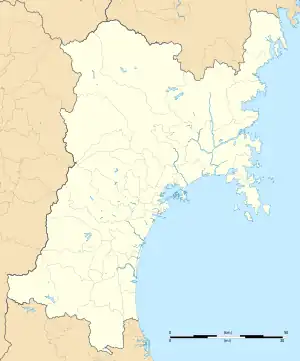Yanaizu Station 柳津駅 | ||||||||||||||||
|---|---|---|---|---|---|---|---|---|---|---|---|---|---|---|---|---|
 Yanaizu Station in July 2019 | ||||||||||||||||
| General information | ||||||||||||||||
| Location | Tsuyama-cho Yanaizu-aze Tanigi 196, Tome-shi, Miyagi-ken 986-0401 Japan | |||||||||||||||
| Coordinates | 38°36′42.34″N 141°18′20.66″E / 38.6117611°N 141.3057389°E | |||||||||||||||
| Line(s) | ■ Kesennuma Line | |||||||||||||||
| Distance | 17.6 km from Maeyachi | |||||||||||||||
| Platforms | 1 island platform | |||||||||||||||
| Tracks | 2 | |||||||||||||||
| Construction | ||||||||||||||||
| Structure type | At grade | |||||||||||||||
| Other information | ||||||||||||||||
| Status | Staffed | |||||||||||||||
| Website | Official website | |||||||||||||||
| History | ||||||||||||||||
| Opened | October 24, 1968 | |||||||||||||||
| Passengers | ||||||||||||||||
| FY2018 | 43 daily | |||||||||||||||
| Services | ||||||||||||||||
| ||||||||||||||||
| Location | ||||||||||||||||
 Yanaizu Station Location within Miyagi Prefecture  Yanaizu Station Yanaizu Station (Japan) | ||||||||||||||||
Yanaizu Station (柳津駅, Yanaizu-eki) is a junction railway station located in the city of Tome, Miyagi Prefecture, Japan operated by the East Japan Railway Company (JR East) . Since the 2011 tsunami, the station has become the de facto terminal station of the Kesennuma Line, with services beyond the station replaced by a provisional bus rapid transit line.
Lines
Yanaizu Station is served by the Kesennuma Line, and is located 17.6 rail kilometers from the terminus of the line at Maeyachi Station.
Station layout
Yanaizu Station has a single island platform connected to the station building by a footbridge. The station is staffed.
Platforms
| 1 | ■ Kesennuma Line | for Maeyachi and Kogota |
| 2 | ■ Kesennuma Line | service suspended |
History
Yanaizu Station opened on October 24, 1968. The station was absorbed into the JR East network upon the privatization of the Japan National Railways (JNR) on April 1, 1987. Since the 2011 tsunami, the station has become the de facto terminal station of the Kesennuma Line, with services beyond the station replaced by a bus rapid transit line.
Passenger statistics
In fiscal 2018, the station was used by an average of 43 passengers daily (boarding passengers only).[1]
Surrounding area
 National Route 45
National Route 45 National Route 342
National Route 342- Yanaizu Post Office
See also
References
- ↑ 各駅の乗車人員 (2018年度) [Station passenger figures (Fiscal 2018)] (in Japanese). Japan: East Japan Railway Company. 2019. Retrieved 11 May 2020.
External links
- Official website (in Japanese)
- "JR気仙沼線 【前面展望 7】 陸前横山⇒柳津" (video). YouTube.com. Archived from the original on 2021-12-13. Retrieved 2011-04-26. video of a train trip from Rikuzen-Yokoyama Station to Yanaizu Station in 2009.
- "JR気仙沼線 【前面展望 8】 柳津⇒陸前豊里" (video). YouTube.com. Archived from the original on 2021-12-13. Retrieved 2011-04-26. video of a train trip from Yanaizu Station to Rikuzen-Toyosato Station in 2009, passing Mitakedō Station at around 03:35 minutes without stopping.